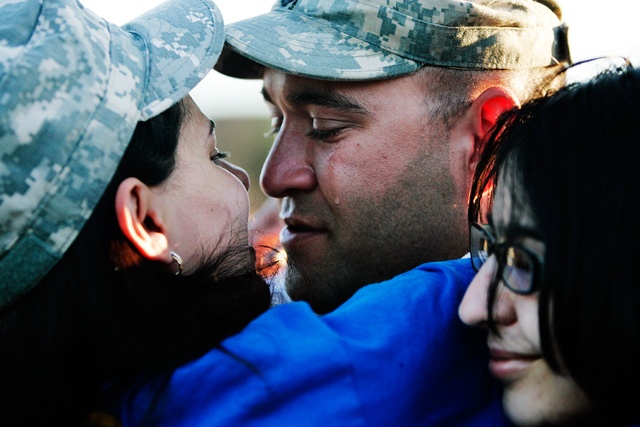2011 Dart Award Winners Named
The winners of the 2011 Dart Awards for Excellence in Coverage of Trauma: The Boston Globe, The Dallas Morning News, NPR with the Center for Public Integrity and NPR with ProPublica.

The Dart Center for Journalism and Trauma, a project of the Columbia Graduate School of Journalism, today announced the winners of the 2011 Dart Awards for Excellence in Coverage of Trauma.
This year’s winners are the Boston Globe, The Dallas Morning News, NPR with the Center for Public Integrity, and NPR with ProPublica. Honorable mentions go to the Arkansas Democrat-Gazette and WLRN's "Under the Sun." The 2011 winners will be recognized at a public ceremony on April 27 at the Columbia Journalism School. Each winning team will receive a $5,000 cash prize.
The Boston Globe received the Dart Award for “A Tormenting Problem: An Exploration of New-Age Bullying.” (Kevin Cullen, columnist; Jenna Russell, Sarah Schweitzer and Patricia Wen, reporters; Bill Greene, Suzanne Kreiter, Joanne Rathe, Aram Boghosian, Kayana Szymczak and Brendan Hoffman, photographers; Steven Wilmsen and Lloyd Young, editors.) This six-part series, spurred by the suicide of a Massachusetts teenager, explores the phenomenon of bullying from every angle, including the experiences of victims and the adults and institutions charged with protecting them.
Judges praised “A Tormenting Problem” for its “innovative approach to reporting,” combining in-depth features with a series of “crusading columns” that together served as a catalyst for a crucial community conversation.
The Dallas Morning News received the Dart Award for “Private Battles.” (David Tarrant, reporter; Sonya Hebert, photojournalist; Chris Wilkins, photo editor; Thomas Huang, supervising editor.) This five-part series documents military families struggling as their loved ones leave to fight in Iraq and Afghanistan. With rigorous reporting on a complex, private and usually hidden subject, the series shows the challenging ways soldiers’ psychological and physical injuries play out in the lives of families and communities.
Judges called “Private Battles” an “insightful, compelling and exhaustively in-depth” series. They praised Tarrant for his “remarkable storytelling” and Hebert for the “honesty” and “depth” of her photographs.
NPR and the Center for Public Integrity received the Dart Award for “Seeking Justice in Campus Rapes.” (From NPR: Joseph Shapiro, correspondent; Robert Benincasa, computer-assisted reporting; Susanne Reber, editor. From CPI: Kristen Lombardi and Kristin Jones, reporters; David Donald, data editor; Gordon Witkin, supervising editor.) This series combined far-reaching investigative reporting with powerful personal stories to expose a pattern in which college students found responsible for sexual assaults face little punishment, while their victims receive little help.
Judges praised “Seeking Justice in Campus Rapes” for bringing to light a neglected issue with widespread impact and, at the same time, conveying the sheer power of human resilience and true agency of victims.
NPR and ProPublica received the Dart Award for “Brain Wars: How the Military is Failing its Wounded.” (For NPR: Daniel Zwerdling, reporter; Susanne Reber, editor. For ProPublica: T. Christian Miller, reporter; Robin Fields, editor.) With great scope and depth, this far-reaching, comprehensive multimedia investigation delves into the ramifications of the signature wound of today’s wars: traumatic brain injury (TBI). The investigation exposed that as many as 40 percent of soldiers' mild TBI had gone undiagnosed, and that the Pentagon’s health plan refused to cover the most proven method of treatment, leading to Congressional hearings and sweeping policy changes.
Judges called the series a “major piece of investigative journalism notable for its scope, depth and analysis.” They commended it for “fulfilling journalism’s promise as a pillar of democracy” and “fundamentally changing the way the public and policymakers understand TBI.”
The Dart Awards are team prizes, recognizing that presenting in-depth journalism on these challenging subjects requires a newsroom-wide commitment. Begun as a newspaper-only competition, the Dart Awards now accept entries from across the media spectrum.
Preliminary judging is conducted by journalists and final judging is conducted by a panel that combines journalists, mental health professionals and victim advocates. The final judges for this year’s Dart Awards were: John Barth, managing director, Public Radio Exchange; Marylene Cloitre, Ph.D., founding director, Trauma and Resilience Program at the NYU Child Study Center and president, International Society for Traumatic Sress Studies; Sheila Colonel, director, Toni Stabile Center for Investigative Journalism at the Columbia Journalism School; Lori Grinker, documentary photographer; and Lisa Sanders, M.D., columnist, New York Times Magazine.
About the Dart Awards and the Dart Center for Journalism and Trauma
Established in 1995, the annual Dart Awards recognize outstanding reporting that portrays traumatic events with accuracy, insight and sensitivity while illustrating the effects of trauma on victims’ lives and the process of recovery from emotional trauma.
The Dart Center for Journalism and Trauma is dedicated to improving media coverage of trauma, conflict and tragedy, and also addresses the consequences of such coverage for those working in journalism. The Dart Center develops educational resources for use in journalism schools and news organizations, provides training and conducts research about news coverage of violence and trauma. It also hosts the Ochberg Fellowships in Journalism and Trauma, a seminar program for mid-career journalists named in honor of psychiatrist Frank Ochberg, M.D., a pioneer in trauma studies.
Read past Dart Award winners.
See a slideshow of Dart Award-winning photography.
About the Columbia University Graduate School of Journalism
For almost a century, the Columbia University Graduate School of Journalism has been preparing journalists in a program that stresses academic rigor, ethics, journalistic inquiry and professional practice. Founded by Joseph Pulitzer in 1912, the school offers Master of Science, Master of Arts and Doctor of Philosophy degrees. For more information, visit www.journalism.columbia.edu
































































































